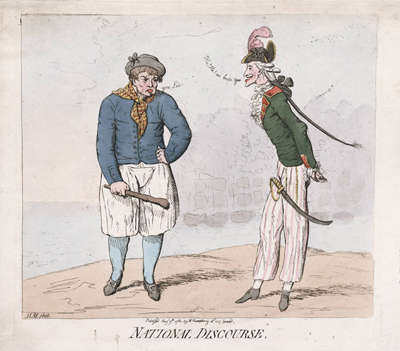National Discourse
Though he is best known and rightly revered for his caricature portraits of the Royal Family, British politicians, and the conspicuous social figures of his day, Gillray did not truly embrace personal portrait caricature until around 1783. Most of his early satires, such as Paddy on Horseback (1779), Sawney in the Bog House (1779), Politeness (1779), John Bull Triumphant (1780), and 'Ah, grant a me von letel bite', rely upon the exaggeration of national symbols and stereotypes.

© Lewis Walpole Library, Yale University
National Discourse (1780) is no exception. The British sailor is portrayed full face, and, as per the national stereotype, buff and well-fed, his club held threateningly in his hand. The Frenchman, on the other hand is shown in profile so that his famously French look of starvation is emphasized. He is, as expected, foppishly dressed with ruffles on his shirt, a wig on his head, a plume in his hat, and a pigtail longer and seemingly stiffer than his sword. The "discourse" of the title consists of a terse exchange between the French sailor who claims "Ha! Ha! we beata You" and the British tar who retorts "you Lie."
They are most likely referring to the naval Battle of Martinique led by Sir George Rodney on the English side and the Comte de Guichen on the French which took place in April, 1780. Very different accounts had appeared in newspapers in the two weeks before Gillray's print appeared. The Paris Gazette naturally favored the French and de Guichen. The English papers gave the victory to Rodney. The London Political Magazine, August 1, 1780, carried detailed accounts of the battle from both sides, where Gillray could have read a translation of the Paris Gazette article. The perspective of Gillray's tar is perhaps best represented by Morning Post and Daily Advertiser for July 24, 1780 which had this to say:
The Paris Gazette containing the extraordinary account of Mons. de Guichen's operations in the West Indies, so far from meeting the least credit on this side of the water has even failed in its intended imposition on the Canaille of France; the whole narrative being generally looked upon at Paris as the most contemptible gasconade that ever insultcd the understanding of a nation.
Today the battle is usually considered to have been a draw where the British missed an opportunity to achieve a significant victory due to miscommunications between Rodney and his commanders.
Sources and Reading
- Commentary from the British Museum on National Discourse
- "George Brydges Rodney, 1st Baron Rodney," Wikipedia
- "Luc Urbain de Bouexic, comte de Guichen," Wikipedia
- "Battle of Martinique (1780)," Wikipedia
Comments & Corrections
NOTE: Comments and/or corrections are always appreciated. To make that easier, I have included a form below that you can use. I promise never to share any of the info provided without your express permission.